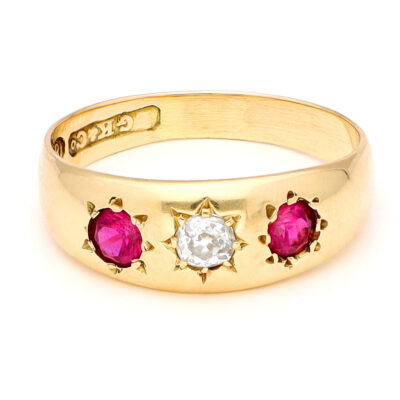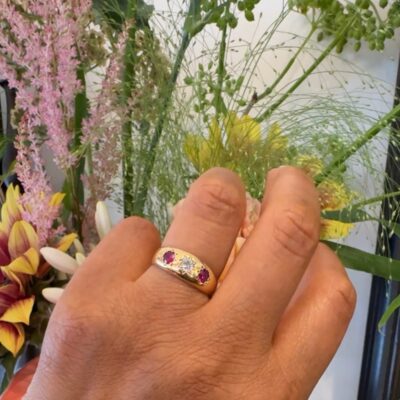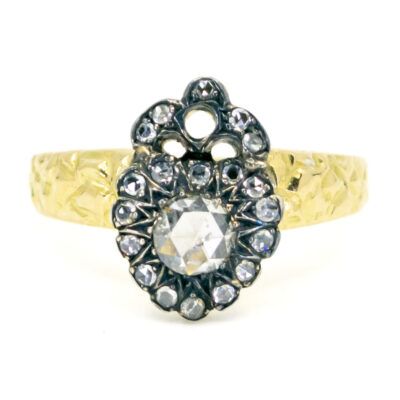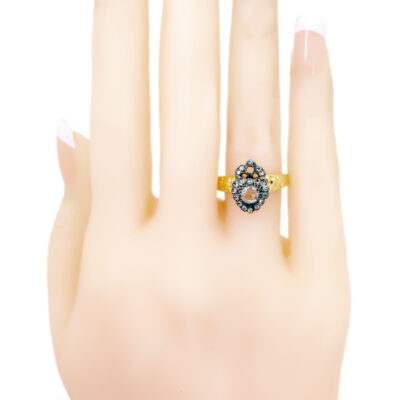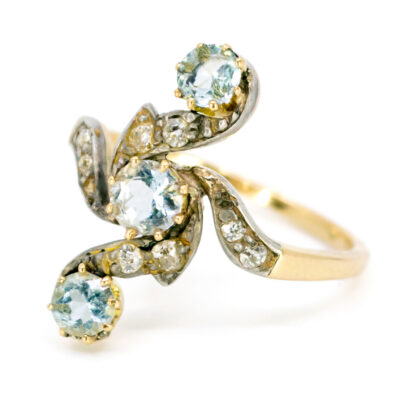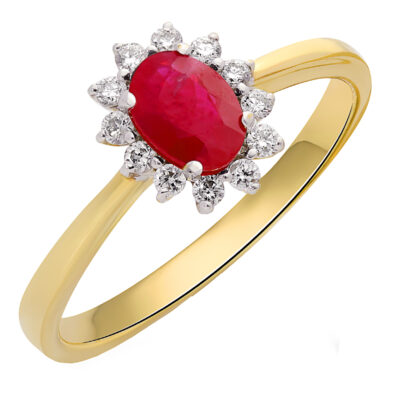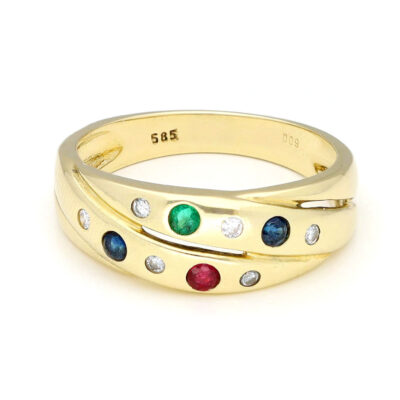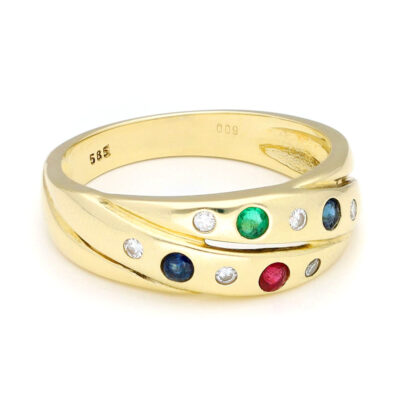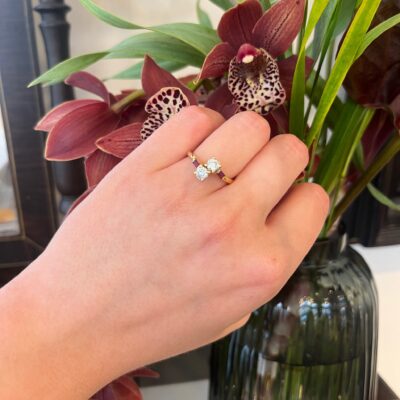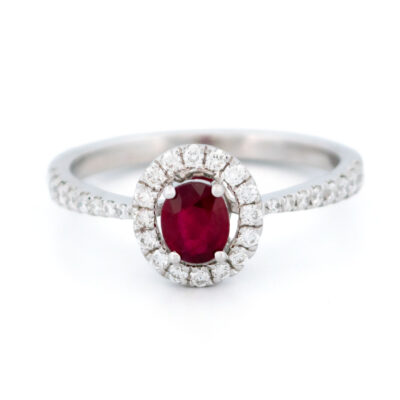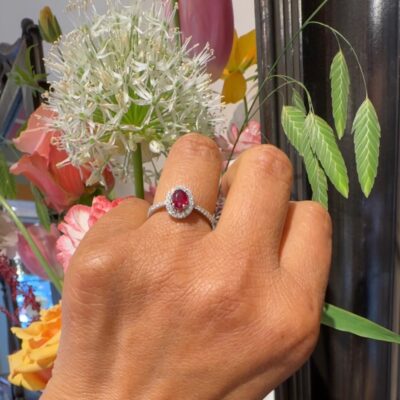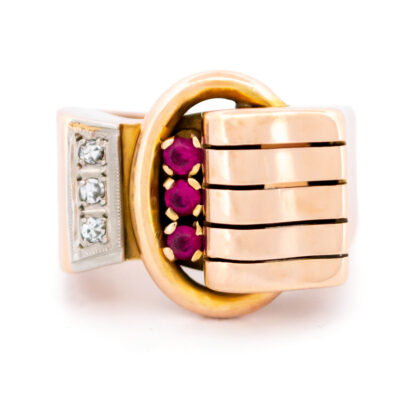This gorgeous antique Late-Victorian ring features a stunning approx. 0.60ct. ruby as the centerpiece, beautifully accented with two old-mine-cut diamonds totaling approx. 0.10ct (H SI1), all set in 14k yellow gold.
Videos
This gorgeous antique Late-Victorian ring features a stunning approx. 0.60ct. ruby as the centerpiece, beautifully accented with two old-mine-cut diamonds totaling approx. 0.10ct (H SI1), all set in 14k yellow gold.
Details: ±0.60ct. Ruby, two totaling ±0.10ct (H SI1) Old-mine-cut diamonds, 14k Ring
Design Era: Late-Victorian (1885-1900).
Size: 17.12 NL / 53.8 FR / 6¾ US / N UK, sizeable (within reason).
Dimensions: H 0.3 x L 0.6 x W 1.3 cm..
Weight in grams: 2,2.
Condition: Good condition – used with some signs of wear.
| Design Era | |
|---|---|
| Design & Historical Context | The Late Victorian or Aesthetic period was a time of great cultural and artistic flourishing in Europe and the United States, and this was reflected in the jewelry of the time. The Aesthetic movement, which emphasized beauty and art for art's sake, was particularly influential on jewelry design during this time. Late Victorian or Aesthetic period jewelry is known for its intricate detailing and use of precious materials such as gold, silver, and diamonds. It often featured motifs such as flowers, animals, and nature scenes, and was inspired by a variety of cultural movements, including the Arts and Crafts movement, which sought to return to traditional craftsmanship and natural materials. One of the most distinctive features of Late Victorian or Aesthetic period jewelry is its emphasis on the use of enamel. Enamel is a type of glass-like material that is fused to a metal surface, and it was often used to add color and detail to jewelry. The French firm, Cartier, was particularly known for its use of enamel in its Late Victorian or Aesthetic period pieces. Late Victorian or Aesthetic period jewelry remains popular and is highly collectible to this day. It is often associated with the elegance and refinement of the time period, and is often seen as a symbol of wealth and sophistication. |
| Key Materials | |
| Materials & Craftsmanship | Ruby: The Gem of Passion and Nobility Ruby, with its fiery red color, is one of the most coveted gemstones in the world, symbolizing passion, power, and nobility. This precious gem belongs to the corundum family, with its striking red hue derived from trace amounts of chromium. Rubies can range in color from deep crimson to vibrant red, often referred to as "pigeon’s blood," the most prized shade. Throughout history, rubies have been revered as symbols of wealth and power. In ancient India, they were called the "king of gemstones" and were believed to protect warriors in battle. In medieval Europe, rubies were thought to bring good fortune, enhance love, and maintain health. Royals and aristocrats adorned themselves with rubies to signify their status and strength. In modern jewelry, rubies are celebrated for their durability and brilliance, with a Mohs hardness of 9, second only to diamonds. This makes them ideal for rings, necklaces, earrings, and other pieces designed for everyday wear. Rubies are often set in gold or platinum, where their vibrant color is showcased to its full potential, adding a touch of luxury and elegance to any design. Ruby is more than just a gemstone; it is a symbol of intense emotion, passion, and enduring strength. Its rich color and historical significance make it a timeless and powerful choice for jewelry that speaks of love, courage, and grandeur. Old-mine-cut diamond: The Vintage Gem of Nostalgia and Charm The Old Mine-cut diamond is a captivating choice for those who appreciate the charm and character of vintage jewelry. Known for its distinctively antique look, this cut dates back to the 18th century and was the precursor to the modern brilliant cut. Old Mine-cut diamonds are characterized by their slightly cushion-like shape, high crown, small table, deep pavilion, and large, open culet, all of which contribute to their unique and romantic appeal. Historically, the Old Mine cut was the most popular diamond cut during the Georgian and Victorian eras. These diamonds were cut by hand, long before the advent of modern cutting technology, which means each stone has its own unique proportions and personality. The cut was designed to maximize the diamond’s brilliance under candlelight, giving it a warm, glowing sparkle that has captivated jewelry lovers for centuries. In modern times, Old Mine-cut diamonds are cherished for their vintage elegance and historical significance. Their distinctive appearance, with a smaller table and larger facets, produces a softer, more subdued brilliance compared to modern cuts, which adds to their old-world charm. These diamonds are often found in antique and heirloom jewelry, such as engagement rings, brooches, and pendants, where their timeless beauty can be fully appreciated. An Old Mine-cut diamond is more than just a gemstone; it is a piece of history, reflecting the craftsmanship and artistry of a bygone era. Its nostalgic appeal and unique sparkle make it a perfect choice for those who seek a diamond that tells a story and exudes vintage elegance and charm. 14k: The Durable Choice for Everyday Elegance 14k gold is a popular and practical choice in fine jewelry, known for its durability, affordability, and beautiful color. The "14k" signifies that the gold is composed of 58.3% pure gold and 41.7% alloyed metals, such as copper, silver, nickel, or zinc. This combination results in a strong and resilient material that can withstand the rigors of daily wear, making it an ideal option for those seeking both beauty and durability. Historically, gold has always been a symbol of wealth and luxury, and 14k gold strikes a perfect balance between the rich appearance of gold and the strength needed for everyday use. Because of its lower gold content compared to 18k or 24k gold, 14k gold is more affordable, making it a popular choice for a wide range of jewelry pieces. In modern jewelry, 14k gold is appreciated for its versatility and variety. It is available in several colors, each achieved by mixing gold with different metals: Yellow Gold: A classic and timeless choice, 14k yellow gold has a warm, golden hue that complements most skin tones and is well-suited for both modern and traditional designs. White Gold: Created by alloying gold with white metals like nickel or palladium, 14k white gold has a sleek, silver-like appearance. It is often rhodium-plated for added shine and is a popular choice for engagement rings and other contemporary jewelry. Rose Gold: Achieved by mixing gold with copper, 14k rose gold has a soft, pinkish hue that has gained popularity for its romantic and vintage appeal. It is a favorite for those seeking a unique and stylish alternative to traditional gold colors. 14k gold is commonly used in a wide array of jewelry, including rings, necklaces, bracelets, earrings, and watches. Its durability makes it especially suitable for pieces that are worn daily, such as wedding bands and engagement rings, where the balance between strength and beauty is crucial. 14k gold is more than just a practical choice; it is a symbol of enduring style and everyday luxury. Its ability to retain the look of gold while offering greater resistance to scratches and dents makes 14k gold a versatile and timeless option for any jewelry collection. Whether in a simple band or an elaborate design, 14k gold offers a perfect blend of elegance and durability that can be enjoyed for years to come. |
| Size | |
| Dimensions | H 0.3 x L 0.6 x W 1.3 cm. |
| Gender | |
| Weight (in grams) | 2,2 |
| Condition |
By following these tips, you can enjoy your precious jewelry for many years to come.
Related Products
-
Diamond Ruby 14k Gypsy Ring 17539-9232
€ 1.695,00 VAT incl. (where applicable) -
Diamond 14k Silver Antique Ring 11144-0107
€ 2.895,00 VAT incl. (where applicable) -
Aquamarine Diamond 18k Silver Antique Ring 3632-1719
€ 1.395,00Original price was: € 1.395,00.€ 1.100,00Current price is: € 1.100,00. VAT incl. (where applicable) -
Diamond Ruby 14k Cluster Ring 18369-9491
€ 1.695,00 VAT incl. (where applicable) -
Diamond Emerald Ruby Sapphire 14k Swirl Ring 17886-9327
€ 1.295,00 VAT incl. (where applicable) -
Diamond Ruby 18k Crossover Ring 17497-9210
€ 2.995,00 VAT incl. (where applicable) -
Diamond Ruby 18k Cluster Ring 16728-8963
€ 1.995,00 VAT incl. (where applicable) -
Diamond Ruby 14k Tank Ring 17309-9165
€ 2.495,00 VAT incl. (where applicable)
- Home
- Collection
- Fine Jewelry
- Silver Jewelry
- Silverware
- Boxes
- Candlesticks
- Salt and pepper shakers
- Miniatures
- Salt cellars
- Spoon Set
- Condiments
- Frames
- Napkin Ring
- Spoon
- Oddities
- Cups
- Vases
- Cutlery
- Serving Spoon And Cake Server
- Candlesticks
- Baskets
- Hanukkiah
- Spice Tower
- Yad
- Tea Set
- Sugar Castor
- Napkin Rings
- Wine Bottle Coaster
- Wine Stopper
- Tea Pot
- Jugs
- Rattles
- Hip Flask
- Miscellaneous
- Rings 💍
- About
- Contact





